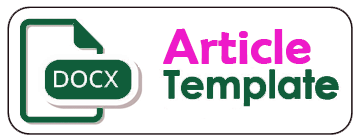PERLINDUNGAN KONSUMEN DALAM PELABELAN PRODUK MENURUT EKONOMI ISLAM
DOI:
https://doi.org/10.33506/sl.v7i1.93Keywords:
Label Produk, Ekonomi Islam, Perlindungan Konsumen,Abstract
Jenis penelitian ini adalah penelitian literer yaitu menggunakan buku – buku yang berkaitan dengan judul di atas. Sedangkan pendekatan yang digunakan adalah pendekatan kualitatif. Dengan metode pengumpulan data yang berkaitan dengan materi pembahasan penulis menggunakan dokumenter. Dalam analisis data penulis menggunakan metode induktif dan deduktif yang kemudian dianalisa dengan menggunakan metode analitis deskriptif. Peneliti memperoleh hasil penelitian bahwa legalitas perundang-undangan perlindungan konsumen di indonesia telah diadopsi dari adanya peran ekonomi islam dalam menciptakan kesejahteraan para pelaku ekonomi yang berasaskan pada Al-Qur’an, Hadist dan penerapannya sejak zaman kekhilafahan. perlindungan konsumen merupakan salah satu upaya dalam penerapan pelaksanaan Ekonomi Islam untuk melindungi konsumen dan untuk memberikan rasa tanggung jawab kepada para pelaku usaha dalam setiap kegiatan produksi sehingga tercapailah keadilan ekonomi dalam setiap kegiatan pemenuhan kebutuhan (barang dan jasa).  Ada beberapa pihak yang mempunyai peran khusus dalam penerapan konsep perlidungan konsumen dalam pelabelan produk pangan diantaranya : pertama: individu, yaitu setiap orang harus sadar akan keberadaannya masing-masing sebagai pihak konsumen yang berhak mendapatkan hak-haknya dan sebagai pelaku usaha yang harus memperhatikan berbagai tanggung jawab berkaitan dengan produk yang dihasilkan. Kedua: pemerintah, pihak ini bertugas menetapkan peraturan (undang-undang) perlindungan konsumen dan memberikan pengawasan atau kontrol terkait dengan harga, kualitas, kadaluarsa yang tertulis di label suatu produk. Ketiga: lembaga perlindungan konsumen, lembaga swasta ini dibentuk dari beberapa masyarakat yang peduli akan pentingnya perlindungan konsumen demi terpenuhinya hak-hak para konsumen.
References
Husni Syawali, Neni Sri Imaniyati. 2000. Hukum Perlindungan Konsumen.Bandung: Mandar Maju
Muhammad, Alimin. 2004 Etika &Perlindungan Konsumen dalam Ekonomi Islam.Jogjakarta: BPFE-YOGYAKARTA.
Petra Widmer, Heinz Frick. 2007.Hak Konsumen dan Ekolabel. Jogjakarta: Kanisius.
Undang – Undang R.I No.8 Tahun 1999 Tentang Perlindungan Konsumen. 2010.
Bandung :Citra Umbara.
Øالة الأغذية والزراعة. 2013. مساعدة المستهلكين على تØقيق تغذية Ø£Ùضل، الرسالة.
علال الÙاسي. 1411Ù‡-1991 Ù…. مقاصد الشريعة الاسلامية ومكارمها. الدار البيضاء: مطبعة Ø§Ù„Ù†Ø¬Ø§Ø Ø§Ù„Ø¬Ø¯ÙŠØ¯Ø©.
غازي عناية. 2002م. موسوعة الاقتصاد الإسلامي (الخصائص العامة). الأردن : دار زهران.
Ù†Ø¬Ø§Ø Ù…ÙŠØ¯Ù†ÙŠ. 2007. آلية Øماية المستهلك ÙÙŠ الاقتصاد الإسلامي، مذكرة مقدمة لنيل درجات الماجستير ÙÙŠ الاقتصاد الإسلامي، كلية العلوم الاجتماعية والعلوم الإسلامية. جامعة الØاج لخضر.
وهبة الزØيلي، أصول الÙقه الإسلامي. الجزائر: دار الÙكر، دط، دت، ج2.
يوس٠Øامد العالم. المقاصد العامة للشريعة الإسلامية. القاهرة: دار الØديث، الخرطوم: الدار السودانية.
سالم Ù…Øمد عبود، Øقوق المستهلك ومنهجية Øمايته مدخل Øضاري مع الإشارة للعراق. د.ت، د. Ø·ØŒ جامعة بغداد.
Downloads
Published
How to Cite
Issue
Section
License
Please find the rights and licenses in Sentralisasi. By submitting the article/manuscript of the article, the author(s) agree with this policy. No specific document sign-off is required.
1. License
The non-commercial use of the article will be governed by the Creative Commons Attribution license as currently displayed on Creative Commons Attribution-NonCommercial-ShareAlike 4.0 International License.
2. Author(s)' Warranties
The author warrants that the article is original, written by the stated author(s), has not been published before, contains no unlawful statements, does not infringe the rights of others, is subject to copyright that is vested exclusively in the author, and free of any third party rights, and that any necessary written permissions to quote from other sources have been obtained by the author(s).
3. User/Public Rights
Sentralisasi's spirit is to disseminate articles published are as free as possible. Under the Creative Commons license, Sentralisasi permits users to copy, distribute, display, and perform the work for non-commercial purposes only. Users will also need to attribute authors and Sentralisasi on distributing works in the journal and other media of publications. Unless otherwise stated, the authors are public entities as soon as their articles got published.
4. Rights of Authors
Authors retain all their rights to the published works, such as (but not limited to) the following rights;
- Copyright and other proprietary rights relating to the article, such as patent rights,
- The right to use the substance of the article in own future works, including lectures and books,
- The right to reproduce the article for own purposes,
- The right to self-archive the article (please read our deposit policy),
- The right to enter into separate, additional contractual arrangements for the non-exclusive distribution of the article's published version (e.g., post it to an institutional repository or publish it in a book), with an acknowledgment of its initial publication in this journal (Sentralisasi).
5. Co-Authorship
If the article was jointly prepared by more than one author, any authors submitting the manuscript warrants that he/she has been authorized by all co-authors to be agreed on this copyright and license notice (agreement) on their behalf, and agrees to inform his/her co-authors of the terms of this policy. Sentralisasi will not be held liable for anything that may arise due to the author(s) internal dispute. Sentralisasi will only communicate with the corresponding author.
6. Royalties
Being an open accessed journal and disseminating articles for free under the Creative Commons license term mentioned, author(s) aware that Sentralisasi entitles the author(s) to no royalties or other fees.
7. Miscellaneous
Sentralisasi will publish the article (or have it published) in the journal if the article editorial process is successfully completed. Sentralisasi's editors may modify the article to a style of punctuation, spelling, capitalization, referencing, and usage that deems appropriate. The author acknowledges that the article may be published so that it will be publicly accessible and such access will be free of charge for the readers as mentioned in point 3.









